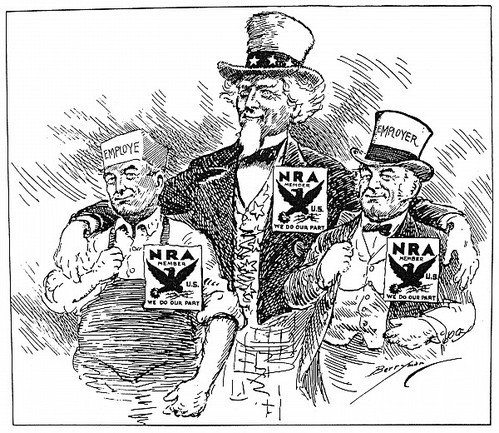

I am of course glad to see President Obama focus the country on what he correctly identifies as the most pressing national problem, the crushing of the middle class. The solution he laid out in his address at Knox College, a middle-out economics which sees the middle class as the engine of the economy, is both good economics and a powerful political message. It is what progressives and Democrats need to keep emphasizing over and over again, both rhetorically and in their legislative agendas.
When it came to the broad foundations of policy, the president’s outline of the pillars of a strong middle class was on point: good jobs, quality education and job training, affordable health care, good housing, retirement security and strong neighborhoods.
Still, I found the speech disappointing. The president only nibbled at the biggest change in our economy, the relentless decline in good jobs.
» Read more about: Pillar Talk: America’s Recovery Foundations Are Cracked »
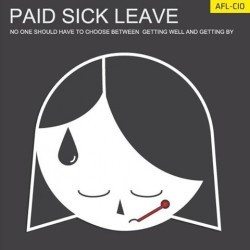
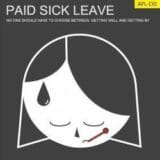
 More than four in 10 private-sector workers and 80 percent of low-wage workers do not have paid sick days. This means people, especially women who are more likely to work in low-wage jobs, constantly have to choose between their health and a paycheck.
More than four in 10 private-sector workers and 80 percent of low-wage workers do not have paid sick days. This means people, especially women who are more likely to work in low-wage jobs, constantly have to choose between their health and a paycheck.
A post in Jezebel, brought to you by the AFL-CIO, explains why the lack of paid sick days causes a ripple effect on our health and communities:
“In fact, more than 80 percent of low-wage workers don’t receive a single paid sick day all year. This contributes to the creation of a sickness loop: Contagious kids go to school because mom can’t stay home with them; expensive emergency room trips are made that could’ve been prevented; employees show up to work and spread viruses to their customers and co-workers.
When young women can’t stay home to get their sleep and soup on,
» Read more about: Sickening: 80% of Low-Wage Workers Lack Paid Sick Days »


Valley after valley,
as if some primeval fiend
dragged its talons here
as it fell from the coastal shelf.
Eighty years ago, after the gold
and copper towns ghosted,
before Gunsmoke came to Vasquez Rocks,
William Mulholland’s dam gave out
and flushed the canyons clean
54 miles to Ventura, and the ocean.
We’ve seeped in, bloomed
like thrush in hollows
flecked with rust-capped roofs,
and bone-white stucco.
Now, across the 14’s eight lanes,
vast scabs of sooty earth
and blacker scrub proclaim:
the land finds ways to slough infection.
——————————————————–——————————————————–
David Eadington is a fifth-generation Southern Californian who lives in West L.A. His work has appeared in several places, including Xelas Magazine and Check Other. He was named one of Los Angeles’


News that George Zimmerman (a “white Latino”) got away with shooting and killing Trayvon Martin, a black teenager armed with nothing more than a bag of Skittles, brought joy to many conservatives. Some went so far as to say “God Bless George Zimmerman.”
Less than 24 hours before the Zimmerman verdict, Grammy-winning singer Marc Anthony, a dark-skinned Latino, was viciously lambasted — for having had the audacity to sing ‘God Bless America’ at Major League Baseball’s All Star Game. One tweeted “Why is some Spanish fuck singing ‘God Bless America’ at the all-star game?” Another wrote, “C’mon MLB. How you gonna pick a Mexican to sing ‘God Bless America’? Was Castro unavailable?”
Anthony happens to be a born-and-bred American citizen of Puerto Rican descent.
This was as ironic as it was painful, seeing as how Irving Berlin, one of America’s greatest songwriters —


In 1909, as one of the scores of short pictures he turned out that year, D.W. Griffith directed A Corner in Wheat, a 14-minute film adaptation of a story by the populist antitrust novelist Frank Norris. In it, a Wall Street speculator buys up so much of America’s wheat and keeps it off the market that prices soar and millions — including the farm family Griffith shows laboring in the fields — go hungry.
Americans’ long-standing apprehensions about banks getting control of the stuff of life are, as we’ve learned again in recent weeks, generally justified. The latest episode of Wall Street’s manipulation of commodity prices was revealed Sunday in a remarkable New York Times article by David Kocieniewski that showed how Goldman Sachs, just by warehousing 1.5 million tons of aluminum, has managed to raise the price of every beer and cola can the world over.


If 2012 was the year of the woman, 2013 is the year of the working mom. And that’s why I’m headed to California. Last week, House Minority Leader Nancy Pelosi along with Congresswomen Rosa DeLauro, Doris Matsui and others announced a new economic agenda for women and families, built on three key pillars for driving women’s economic advancement: 1) equal pay for equal work, 2) work-family balance, including paid sick leave and a livable minimum wage, and 3) access to quality, affordable child care.
As many have noted, these priorities are not new ideas. Women have been advocating for decades for these policies, because they work, they are fair and they are critical to the success of our nation. What is new is the momentum behind putting these practical solutions to work so that we can kick-start an economy that continues to languish and restore the American promise for our children — that their futures should be brighter,


I am a single mother of four. Every day my heart aches with worry about my kids and their futures. Today I went on strike to protest retaliation. I did it for my children.
Please consider a donation of $50 or more to support workers while we are on strike.
I work in a warehouse moving Walmart merchandise and I make $8 an hour. In a good week I earn $300. Our rent alone is $800 a month. Going on strike means no paycheck, but your support can help us during this time.
The math doesn’t add up. My coworkers and I cannot support our families on these wages, but when we have spoken up about the poverty we face and the dangerous working conditions inside the warehouse, we have been targeted. We’ve had enough. The warehouse managers follow us around, they have installed cameras to watch us constantly,
» Read more about: ‘Today I Went on Strike’ — A Strike Fund Appeal »
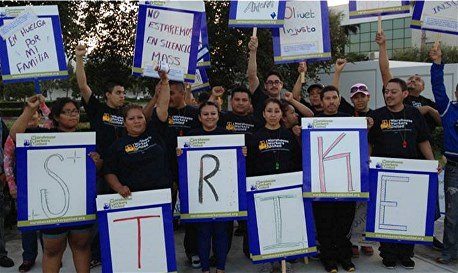

Breaking News: Warehouse workers who move suitcases are on strike at Walmart luggage and apparel subcontractor Olivet International. The bulk of the Riverside County facility’s inventory is sold by Walmart and the strikers hold the retail chain equally culpable for the poor working conditions employees claim exist at Olivet. The work stoppage is aimed at retaliation allegedly suffered by workers who drew public attention to safety risks at the warehouse.
According to a post by Josh Eidelson that appeared today on the Nation‘s website:
Today’s strike is backed by Warehouse Workers United, a project of the Change to Win union federation. It comes two months after 21 Olivet warehouse employees filed a formal complaint with the California Division of Occupational Safety and Health, alleging rampant safety violations: emergency exits blocked by boxes and merchandise; forklift brakes, seatbelts, and horns that don’t work;
» Read more about: Walmart Contract-Warehouse Workers Go on Strike »


DealBook recently published a piece by Kent Rowey that makes a troubling argument for selling public services and infrastructure to Wall Street banks and other corporations. Under the guise of making recommendations for Detroit, Mr. Rowey tried to sell the idea that auctioning off our most vital services and assets to for-profit companies is a simple win-win solution for strapped governments.
It sounds simple, but the real track record of public-private partnerships is fraught with problems.
Mr. Rowey holds up the example of Chicago’s 36,000 parking meters that were sold in a 75-year lease to an investor group backed by Morgan Stanley as a success. In fact, Chicago taxpayers, investors and mayors across the country will tell you that not only was it an unmitigated disaster, it is also Exhibit A in the folly of blindly giving up taxpayer control of services.
An after-the-fact investigation by the city’s inspector general concluded that the decision to enter the lease contract lacked “meaningful public review” and neglected the city’s long-term interests to solve a short-term budget crisis.
» Read more about: Privatization of Public Resources Can Be Highway Robbery »


Sed ut perspiciatis unde omnis iste natus error sit voluptatem accusantium doloremque laudantium, totam rem aperiam, eaque ipsa quae ab illo inventore veritatis et quasi architecto beatae vitae dicta sunt explicabo.
Neque porro quisquam est, qui dolorem ipsum quia dolor sit amet, consectetur, adipisci velit, sed quia non numquam eius modi tempora incidunt ut labore et dolore magnam aliquam quaerat voluptatem. Ut enim ad minima veniam, quis nostrum exercitationem ullam corporis suscipit laboriosam, nisi ut aliquid ex ea commodi consequatur.
At vero eos et accusamus et iusto odio dignissimos ducimus qui blanditiis praesentium voluptatum deleniti atque corrupti quos dolores et quas molestias excepturi sint occaecati cupiditate non provident, similique sunt in culpa qui officia deserunt mollitia animi, id est laborum et dolorum fuga.
Quis autem vel eum iure reprehenderit qui in ea voluptate velit esse quam nihil molestiae consequatur, vel illum qui dolorem eum fugiat quo voluptas nulla pariatur.


It is widely recognized that economists are not very good at economics. That is why we are looking at a decade of economic stagnation with tens of millions of people being unemployed or underemployed in Europe and the United States.
If economists were better at economics, central banks in the United States and Europe would have recognized the housing bubbles that were driving economies in the last decade. They would have taken steps to rein them in before they grew so large that their inevitable collapse would sink the world economy.
We recently had the opportunity to see that economists are no better at moral philosophy than economics. In a recent paper, Harvard economics professor Greg Mankiw, the former chief economist to President Bush and one of the country’s most prominent conservative economists, compared progressive taxation to forcefully removing a person’s kidney for a transplant.
That is probably not how most people would view imposing a high tax rate on rich people.
» Read more about: Economic Inequality: The Heart (and Kidney) of the Matter »


Has the New York Times turned into a latter-day Daily Worker, or are labor conditions in America becoming so bad that even the national paper of record is demanding social justice? A look at this past Sunday’s Section A revealed no fewer than three stories delving into the predatory practices of employers and financial players.
The front page led with an eye-opening investigation into how investment banks– including Goldman Sachs, JP Morgan Chase and Morgan Stanley – have reaped billions from stockpiling commodities in giant warehouses across the country.
The story, written by David Kocieniewski, focused on 27 mega-warehouses holding aluminum located around Detroit. (You remember Detroit – the city whose retired employees’ pensions are now threatened under bankruptcy proceedings, as banks and other creditors are being escorted to the front of the collection line?) The Times found that by needlessly shifting thousands of palettes of aluminum ingots from one warehouse to another,
» Read more about: From Goldman Sachs to Walmart to Urasawa: A NYT Trifecta »


One way to view Detroit’s bankruptcy — the largest bankruptcy of any American city — is as a failure of political negotiations over how financial sacrifices should be divided among the city’s creditors, city workers and municipal retirees — requiring a court to decide instead. It could also be seen as the inevitable culmination of decades of union agreements offering unaffordable pension and health benefits to city workers.
But there’s a more basic story here and it’s being replicated across America: Americans are segregating by income more than ever before. Forty years ago, most cities (including Detroit) had a mixture of wealthy, middle-class and poor residents. Now, each income group tends to lives separately, in its own city — with its own tax bases and philanthropies that support, at one extreme, excellent schools, resplendent parks, rapid-response security, efficient transportation and other first-rate services; or, at the opposite extreme, terrible schools, dilapidated parks, high crime and third-rate services.


Americans believe in speaking up when something is wrong and working together to improve their lives. The freedom of speech and freedom of association are core American values and basic rights enshrined by our nation’s Constitution. Yet while our basic rights as Americans are protected under the law, Walmart doesn’t think these laws apply to them.
In recent weeks, Walmart has escalated its illegal campaign of punishing workers who exercise their right to come together and speak out for change. In attempting to silence those workers who speak out, the company has fired or disciplined more than 60 workers.
The recent string of firings comes on the heels of last month’s protest in front of Walmart’s headquarters in Bentonville, Arkansas. In late May, members of OUR Walmart held a nationwide strike and Ride for Respect caravan protesting Walmart’s unfair labor practices (ULP), which took them on a bus ride from Southern California to Bentonville,
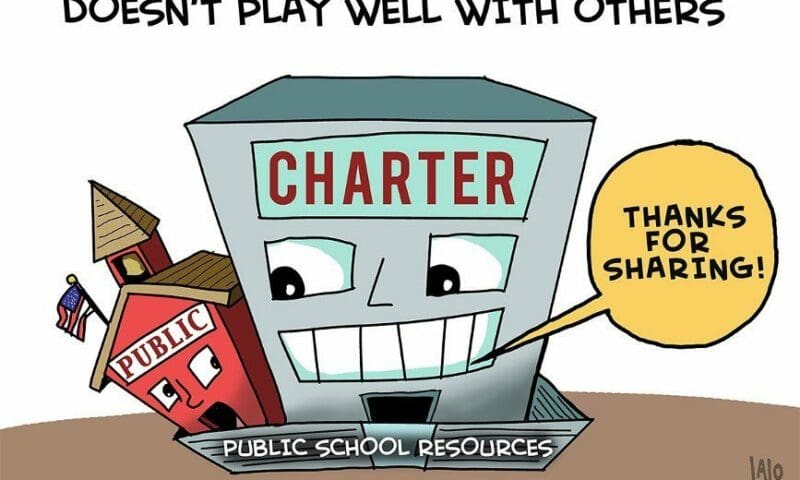

See Gary Cohn’s article, “Why Charter Schools Are Tearing Public Campuses Apart.”
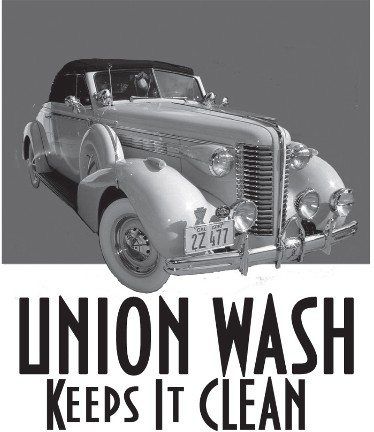

In major urban centers, car washing is an industry that relies on full-time labor. Like many other low-wage jobs in the Americanservice economy, the workers who perform this labor are mainly adults with families to support, and they are often recent immigrants. Once considered unorganizable, the “carwasheros” (as the carwash employees call themselves) are now standing up. They are demanding to be taken seriously as employees who shouldn’t be expected to survive on a teenager’s summer salary.
Recent victories have resulted in some of the first-ever carwash collective bargaining contracts. In Queens, New York, workers organized with the backing of an unusual community-labor alliance – a joint effort by Make the Road New York and the Retail, Wholesale and Department Store (RWDSU) union. They succeeded in winning better, standardized pay scales and job protections in their first contract in June. At a carwash in Santa Monica, California, workers won their first contract in 2011 as members of the United Steelworkers Local 675 and with the support of a broad-based Los Angeles coalition called the Clean Carwash Campaign.


Joint Statement from Metro Detroit AFL-CIO President Chris Michalakis and Michigan State AFL-CIO President Karla Swift on Detroit’s Bankruptcy Filing:
Every step of the way, the citizens of Detroit were told that they had to give up their right to democratic representation in order to avoid bankruptcy. Now that this filing has come anyway, it is clear that either state control has failed or that Governor Snyder and his emergency manager appointee were not honest about their intentions in the first place.
[Friday’s] action can be taken as confirmation that Kevyn Orr was hired, secretly and ahead of a declared financial emergency, because he is a bankruptcy expert.
As Chapter 9 proceedings begin, Detroit cannot afford any further attacks on working families, who have already sacrificed so much without a say in the process. City workers have already made severe concession to keep the city afloat. It is time to put the needs of Detroit residents above the interests of out of town creditors.
» Read more about: Detroit Unions Ask: Was Bankruptcy Inevitable? »


 It took about a year of hard-fought organizing and several weeks of balloting, but Wednesday the vote tally spoke for itself: Nearly 70 percent of New Jersey-based port truck drivers employed by the Toll Group chose to form a union. The 112 truckers, who include long-haul drivers and hostlers that move trailers within Toll’s yards, have affiliated with Teamster Local 469.
It took about a year of hard-fought organizing and several weeks of balloting, but Wednesday the vote tally spoke for itself: Nearly 70 percent of New Jersey-based port truck drivers employed by the Toll Group chose to form a union. The 112 truckers, who include long-haul drivers and hostlers that move trailers within Toll’s yards, have affiliated with Teamster Local 469.
Toll, an Australian-owned transportation and logistics industry giant, had only last year agreed to allow drivers at its Ports of Los Angeles and Long Beach facility to unionize with Teamster Local 848, capping a contentious struggle there. (The company’s Australian facilities have long been unionized.) Rather than learn from its California experience and take a constructive approach to labor relations, Toll flat-out fought its East Coast workers, who service the ports of New York and New Jersey. During its organizing campaign, the Teamsters filed charges with the National Labor Relations Board,
» Read more about: New Jersey Port Drivers Choose Union Representation »


 According to accounts in the business press, there is a campaign among Washington insiders to get Larry Summers appointed as Ben Bernanke’s replacement as Federal Reserve Board chair. This could end up being the scariest horror movie of the summer.
According to accounts in the business press, there is a campaign among Washington insiders to get Larry Summers appointed as Ben Bernanke’s replacement as Federal Reserve Board chair. This could end up being the scariest horror movie of the summer.
It is bizarre that Summers would be seriously considered as the next Fed chair if for no other reason that there is an obvious replacement for Bernanke already sitting at the Fed. Janet Yellen, the vice-chair, has in the past served as the president of the Federal Reserve Bank of San Francisco, a member of the Board of Governors in the 1990s and head of President Clinton’s Council of Economic Advisers. She also has an impressive academic background, having been a professor at both Berkeley and Harvard.
No woman has ever served as chair of the Fed and Yellen would be an obvious choice to break the barrier.
» Read more about: Larry Summers: ‘Scariest Horror Movie of the Summer’? »
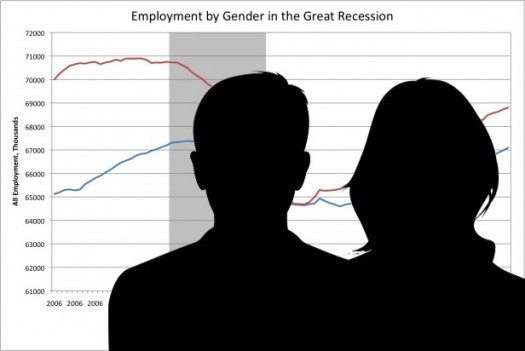
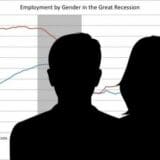
How are men doing in our anemic economic recovery? David Brooks, after discussing his favorite Western movie, argues in his latest column, Men on the Threshold, that men are “unable to cross the threshold into the new economy.” Though he’d probably argue that he’s talking about generational changes, he focuses on a few data points from the current recession, including that “all the private sector jobs lost by women during the Great Recession have been recaptured, but men still have a long way to go.”
Is he right? And what are some facts we can put on the current recovery when it comes to men versus women?
Total Employment
Men had a harder crash during the recession, but a much better recovery, when compared with women.
Indeed, during the first two years of the recovery expert analysis was focused on a situation that was completely reversed from Brooks’